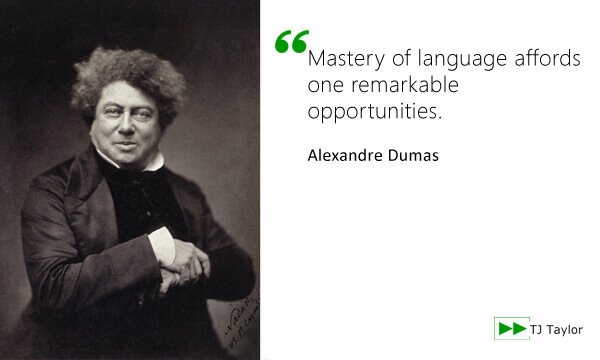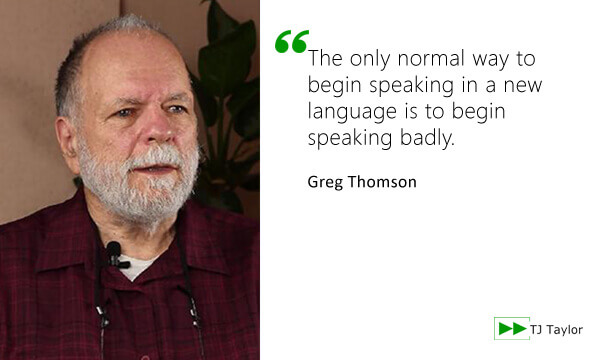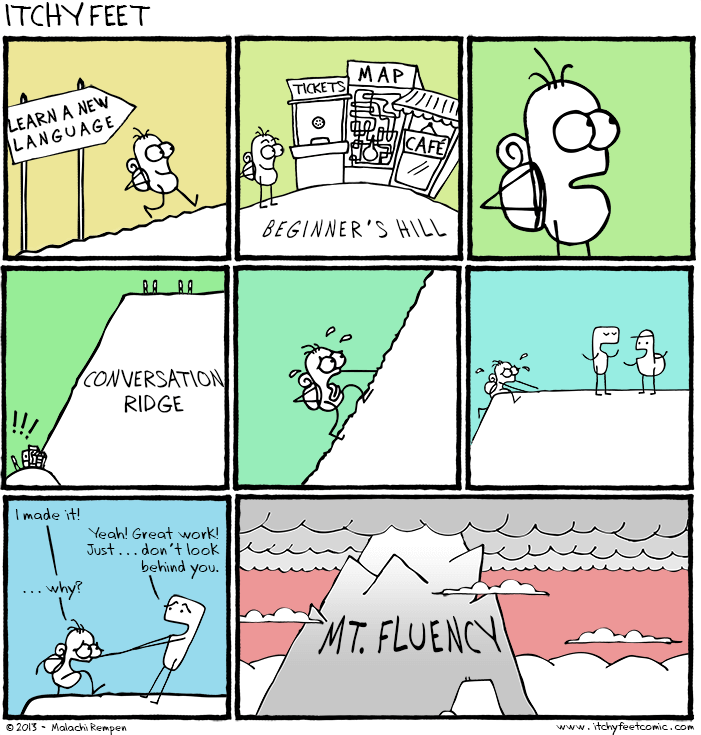Do you have problems remembering English vocabulary or expressions?
Do you find it difficult to memorize idiomatic expressions or slang? Do
you struggle to understand grammar concepts?
If you answered “yes” to any of these questions, you’re not alone: most language learners have these problems.
Even native speakers of English have a hard time remembering spelling for some words because often there is no direct correlation between English spelling and pronunciation.
The secret to remembering new words and spellings – for both native and non-native speakers – is to develop a good memory. If you are one of those people who think that they have a poor memory, read on.
This article will explain some techniques that will help you remember vocabulary and grammar much more easily.
First, we need to understand how memory works.
In some cases, however, when the time comes to retrieve that information, we can’t find it. Sometimes, even when we try hard to memorize something, the piece of information just won’t cooperate and stay in the appropriate slot in our memory.
Mnemonics are images, sounds, rhymes, or acronyms that establish a link to a word, expression, or spelling that is difficult for you to remember. This link connects the two items in your memory, so if you remember one of them, you will easily remember the other.
Imagine this: a stormy sea with bits and pieces of a shipwrecked boat, seaweed and other debris floating around aimlessly on the surface.

This is what happens to a poorly organized memory. It is difficult to find something you need in that huge mass of unrelated bits of information.
Now, imagine a port or harbor where every boat is anchored or docked in the right place. Everything is organized and in its place.

The image is a bit unrealistic, but hopefully it will help you imagine what well organized memory is like. Following this analogy, a mnemonic would be an anchor keeping a piece of information in place and not allowing it to float away.
Let’s take a look at a few different ways we can use these “memory anchors” to learn a language.
Here is a great example: many people are not sure how to spell the word “vacuum”. There is a double letter in the middle, but which one, “c” or “u”? This video has a great mnemonic to help:
It is particularly difficult to remember the spelling of words that sound alike but have different meanings. Once again, mnemonics to the rescue!
I used to confuse two words: compliment and complement. Then I came across a mnemonic that helped me remember the difference and I’ve never had trouble with these two words ever since. I’ll share the mnemonic trick with you.
A compliment is an expression of admiration, praise.
The difference between the spelling of the words compliment and complement is that one has the letter i in the middle and the other has the letter e. So how do we remember which one is which?
Here is a mnemonic: The opposite of a compliment is an insult. Insult starts with the letter I, therefore compliment is spelled with the letter i in the middle.
When one thing complements another, it usually enhances it in some way. It makes the other thing even better. You know that enhance starts with an e, so just remember that if one thing enhances another, it complements it – and it is spelled with the letter e in the middle.
Another great way to remember words that have similar spelling or pronunciation is to make a mnemonic sentence that includes all the words you’re trying to remember.
The sentence needs to make some sense and should be easy to visualize and remember. For example: A barefoot bear drank beer.

For example, to remember the meaning of the idiom “to be all ears”, imagine a person with huge, elephant-like ears pointed in your direction. This image will help you remember the meaning and the central idea of this idiom:

What do people use to listen and to hear? Ears, of course. So if a person has huge ears, that means he is listening intently and paying attention to what you have to say.
It may take a long time and several attempts to learn a grammar rule before we really “own” the concept.
By owning I mean that you feel absolutely confident about it and you use it correctly 100% of the time.
Take a look at the 4 steps I follow when internalizing an “alien” grammar concept. Let’s see if they remind you of your own experiences:
The answer is: Yes. It is difficult, but possible.
Here is an example. In Slavic languages there are no auxiliary verbs for the perfect tense (I have read the book) or the continuous tense (I am reading the book).
In Russian there is no difference between, for example, “I read” and “I am reading” – Russian speakers understand the time aspect from the context, but there is no distinction between the two verb forms.
To help Russian speakers conceptualize the difference between the Present Simple and Present Continuous in English, I would ask them to try to imagine two pictures.
For repetitive actions (ie the Present Simple: “I read every day”), imagine a kangaroo jumping up and down on the calendar: I read on Monday (jump), Tuesday (jump), Wednesday (jump), etc.

For actions happening right now (ie the Present Continuous: “I am reading”), I would ask them to imagine a river in front of them that was filled with words and phrases. I would say, “You’re sitting on the bank of the river, and the text is flowing past you, from left to right to illustrate that process of reading right now.”
At first the difference between the two actions can be quite confusing – one is repetitive and general, and the other is developing right now, in front of you. But the images certainly help to visualize the difference, and eventually to internalize it as well.
These are the verbs that are not normally used in the continuous form, even when we are talking about temporary situations or states. Have you ever been confused about the logic of stative verbs? How can the same verb denote a state and an action in the same situation?
Imagine you are that girl performing this action.
Imagine every little step of the process: you take the flower in your hand, then bring it to your nose, and gently inhale the air through your nostrils to experience the delicate smell of the rose. Is there an action in this?
Hopefully you SEE the action and you UNDERSTAND that there is in fact an action associated with this.
Now, imagine you are the rose.
What are you doing? What is your action? If you think about this for a few seconds, it will become clear that there is no action on the part of the flower.
Let’s consider other examples:
If you answered “yes” to any of these questions, you’re not alone: most language learners have these problems.
Even native speakers of English have a hard time remembering spelling for some words because often there is no direct correlation between English spelling and pronunciation.
The secret to remembering new words and spellings – for both native and non-native speakers – is to develop a good memory. If you are one of those people who think that they have a poor memory, read on.
This article will explain some techniques that will help you remember vocabulary and grammar much more easily.
First, we need to understand how memory works.
So how does our memory work?
Our memory stores information. The first time we see, hear, smell, taste, or touch something our memory places that information in a certain area.In some cases, however, when the time comes to retrieve that information, we can’t find it. Sometimes, even when we try hard to memorize something, the piece of information just won’t cooperate and stay in the appropriate slot in our memory.
Can I improve my memory?
Yes! You can use memory aids: mnemonics.Mnemonics are images, sounds, rhymes, or acronyms that establish a link to a word, expression, or spelling that is difficult for you to remember. This link connects the two items in your memory, so if you remember one of them, you will easily remember the other.
Imagine this: a stormy sea with bits and pieces of a shipwrecked boat, seaweed and other debris floating around aimlessly on the surface.

This is what happens to a poorly organized memory. It is difficult to find something you need in that huge mass of unrelated bits of information.
Now, imagine a port or harbor where every boat is anchored or docked in the right place. Everything is organized and in its place.

The image is a bit unrealistic, but hopefully it will help you imagine what well organized memory is like. Following this analogy, a mnemonic would be an anchor keeping a piece of information in place and not allowing it to float away.
Let’s take a look at a few different ways we can use these “memory anchors” to learn a language.
Using mnemonics to remember spelling
Spelling mnemonics are used by both native speakers and language learners because English spelling can be very confusing! If you cannot remember the spelling for certain words, create a mental connection to something that will help you remember.Here is a great example: many people are not sure how to spell the word “vacuum”. There is a double letter in the middle, but which one, “c” or “u”? This video has a great mnemonic to help:
Hear, here! How to remember homophones
Weather or whether? Hear or here? There, their, or they’re?It is particularly difficult to remember the spelling of words that sound alike but have different meanings. Once again, mnemonics to the rescue!
I used to confuse two words: compliment and complement. Then I came across a mnemonic that helped me remember the difference and I’ve never had trouble with these two words ever since. I’ll share the mnemonic trick with you.
A compliment is an expression of admiration, praise.
He told her he admired her music, and she returned the compliment by saying that she was a fan of his poetry.A complement, on the other hand, is something that enhances or completes something.
The necklace was a perfect complement for her dress.Both words can be verbs as well as nouns, and both can have other meanings depending on the context, but these are the most important meanings.
The difference between the spelling of the words compliment and complement is that one has the letter i in the middle and the other has the letter e. So how do we remember which one is which?
Here is a mnemonic: The opposite of a compliment is an insult. Insult starts with the letter I, therefore compliment is spelled with the letter i in the middle.
When one thing complements another, it usually enhances it in some way. It makes the other thing even better. You know that enhance starts with an e, so just remember that if one thing enhances another, it complements it – and it is spelled with the letter e in the middle.
Another great way to remember words that have similar spelling or pronunciation is to make a mnemonic sentence that includes all the words you’re trying to remember.
The sentence needs to make some sense and should be easy to visualize and remember. For example: A barefoot bear drank beer.

The sentence needs to make sense, but the image doesn’t!
Idiomatic expressions and slang
A picture depicting a literal interpretation of an idiom can be an excellent mnemonic.For example, to remember the meaning of the idiom “to be all ears”, imagine a person with huge, elephant-like ears pointed in your direction. This image will help you remember the meaning and the central idea of this idiom:

What do people use to listen and to hear? Ears, of course. So if a person has huge ears, that means he is listening intently and paying attention to what you have to say.
And what about grammar?
If English has a different grammar structure from your native tongue, it can be difficult to understand the logic behind “alien” grammar concepts.It may take a long time and several attempts to learn a grammar rule before we really “own” the concept.
By owning I mean that you feel absolutely confident about it and you use it correctly 100% of the time.
Take a look at the 4 steps I follow when internalizing an “alien” grammar concept. Let’s see if they remind you of your own experiences:
- I read the rules and I read/see/hear some examples of how it is used. I understand the meaning (or at least I think I do). The rule makes sense. More or less…
- I start doing exercises, and now I realize that I don’t completely understand it. I need to see/hear/read some more examples before I start using it myself.
- OK, so I think I understand the concept now, but there are so many exceptions! And I hear native speakers using the concept “incorrectly”! Are they making mistakes, or is there something that my grammar book and my teacher haven’t told me yet?
- I now know (hopefully) how to use this piece of grammar. I can use it correctly, and I know the various contexts where I need to use it. I own the concept now.
The answer is: Yes. It is difficult, but possible.
How to use mnemonics for grammar
It’s important to visualize (imagine) the new concept; the mental image will help you understand and remember it.Here is an example. In Slavic languages there are no auxiliary verbs for the perfect tense (I have read the book) or the continuous tense (I am reading the book).
In Russian there is no difference between, for example, “I read” and “I am reading” – Russian speakers understand the time aspect from the context, but there is no distinction between the two verb forms.
To help Russian speakers conceptualize the difference between the Present Simple and Present Continuous in English, I would ask them to try to imagine two pictures.
For repetitive actions (ie the Present Simple: “I read every day”), imagine a kangaroo jumping up and down on the calendar: I read on Monday (jump), Tuesday (jump), Wednesday (jump), etc.

For actions happening right now (ie the Present Continuous: “I am reading”), I would ask them to imagine a river in front of them that was filled with words and phrases. I would say, “You’re sitting on the bank of the river, and the text is flowing past you, from left to right to illustrate that process of reading right now.”
At first the difference between the two actions can be quite confusing – one is repetitive and general, and the other is developing right now, in front of you. But the images certainly help to visualize the difference, and eventually to internalize it as well.
And another grammar example
Let’s consider another example of a difficult grammar concept: stative verbs.These are the verbs that are not normally used in the continuous form, even when we are talking about temporary situations or states. Have you ever been confused about the logic of stative verbs? How can the same verb denote a state and an action in the same situation?
Example: “The girl is smelling the rose” compared to “The rose smells good”.How do we know if it is an action verb (and so we can use the Present Continuous), or a stative verb (and so we can’t use the Present Continuous)? Visualizing will help you again.
Imagine you are that girl performing this action.
Imagine every little step of the process: you take the flower in your hand, then bring it to your nose, and gently inhale the air through your nostrils to experience the delicate smell of the rose. Is there an action in this?
Hopefully you SEE the action and you UNDERSTAND that there is in fact an action associated with this.
Now, imagine you are the rose.
What are you doing? What is your action? If you think about this for a few seconds, it will become clear that there is no action on the part of the flower.
Let’s consider other examples:
The cook is tasting the soup. The soup tastes good.
I’m feeling your forehead. Your forehead feels really hot. Are you sick?Can you visualize yourself being the cook, and being the soup? Can you picture yourself as a forehead?!
How to create mnemonics
- Not all words and expressions are equally important. Because of that, not all difficult vocabulary items “deserve” to have a mnemonic. Identify the words and expressions that are really important to you professionally or socially, and create mnemonics for them first. Don’t worry about esoteric or very rare words that you can’t remember.
- Create word mnemonics in English, not your native tongue. If your mnemonic is an image, try to think of it only in English.
- Do not overdo it: try not to create too many mnemonics. If you do, you could overwhelm yourself and spend too much time trying to remember mnemonics instead of reading, writing, or speaking in English. We all have a limit to how much we can remember, so explore yours.
- Not every mnemonic will make sense to other people. Personally, I divide my mnemonics into two groups: public and private. Public are the ones that will be easily understood by other people. Private, on the other hand, will make sense only to you. Private mnemonics are very difficult to explain to other people, but don’t worry about that: the only thing that matters is your own ability to quickly retrieve the word or concept from your memory.










